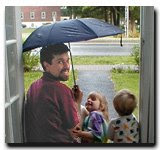Compost year round to ease the burden on your local landfill while building soil fertility in your own landscape.
- Composting is the best way to handle food scraps and other solid waste that can decompose into a beneficial soil amendment.
- Anything that was once living can be composted, including kitchen scraps, yard clippings, paper, cardboard, meat, fish, bones and wood.
- The easiest items to compost are vegetables, coffee grounds, leaves, grass clippings, and other soft plant trimmings.
- A kitchen compost pail makes it convenient to collect and transport food waste to another location for composting.
- A successful composting process breaks down waste into a rich humus without producing foul odors or attracting pests.
- Finished compost improves soil fertility, providing minerals and nutrients that are essential for plant growth.
- Any soil can be improved by adding compost: sandy soils will better retain water and clay soils will become less dense.
- You can compost outdoors or indoors, in any climate and any season, using a variety of tools, techniques and equipment.
- Depending on the mix of materials, you will produce about 1 liter of compost for every 8 liters of garbage.
- According to the EPA, at least 40% of the municipal solid waste stream could be composted instead of landfilled, incinerated, or dumped at sea.
- It is a common misconception that putting food waste in your garbage helps the operation of incinerators and landfills; it does not.
- Wet food waste reduces the efficiency of incinerators, because water doesn't burn.
- Rather than breaking down naturally, organic materials in landfills persist and can release dangerous gases and contribute to water pollution.
- Aerobic (with oxygen) decomposition is faster and does not produce the foul odors associated with anaerobic (without oxygen) decomposition.
- During an aerobic composting process, microorganisms combine oxygen from the air with hydrogen and carbon in the waste materials, to release energy and water and carbon dioxide gas.
- During an anaerobic composting process, microorganisms employ slower metabolic pathways to release energy and methane and other gases that do not contain oxygen.
- Water, air and warm temperatures are necessary for aerobic composting.
- With suitable composting conditions, you can produce compost in a few days.
- The fastest and most reliable way to compost all year round is to chop waste into small pieces and use an automatic composter like the NatureMill, which includes a fan, heater and mixer.
- You can compost in simple piles, burial pits, above-ground digesting bins, tumbling bins, and composting worm bins.
- Watering and turning a compost pile can dramatically improve the speed and consistency of the results.
- All organic materials contain varying amounts of nitrogen and carbon. "Green" materials such as plant clippings, kitchen scraps and manure have a higher nitrogen content than "brown" materials such as dry leaves, cardboard and paper.
- The ideal ratio of nitrogen and carbon for decomposing microorganisms to thrive, requires roughly equal amounts of greens and browns.
- Storing shredded, dry fall leaves in a garbage can or bag is a good way to keep a ready supply of browns for use in the spring and summer.
- Tissue paper, paper towels, newspaper, office paper, cardboard, wood chips and sawdust are other sources of browns.
- If you add too many greens, your mixture may begin to smell bad. If you add too many browns, your mixture will take longer to turn into compost.
- Finished compost is black or dark brown in color, uniform in consistency, and earthy in odor.
- Composting recycles nutrients to benefit lawns, gardens, trees and bushes, and houseplants.
- You can mix compost into your garden soil, use it for sprouting seeds, enrich potting soil with it, apply it as a mulch, or simply spread it on your lawn.








